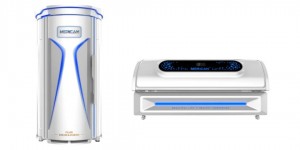Tanning beds use special lamps that emit ultraviolet (UV) light, which stimulates the skin to produce melanin — the pigment responsible for a tan. The main types of UV light involved are:
-
UVA Rays (315–400 nm):
-
These penetrate deep into the skin.
-
Responsible for most of the immediate tanning effect.
-
Excessive exposure can cause premature skin aging and increase the risk of skin cancer.
-
-
UVB Rays (280–315 nm):
-
Affect the outer layer of the skin.
-
Help produce a longer-lasting tan by stimulating melanin production.
-
Overexposure can cause sunburn and skin damage.
-
UV Ratio in Tanning Beds:
Most modern tanning beds use a combination of about 95% UVA and 5% UVB, though the exact ratio can vary depending on the bed design and local regulations.
Safety Tips:
-
Always follow the manufacturer’s recommended exposure time.
-
Wear protective eyewear to prevent UV-related eye damage.
-
Avoid tanning beds if you have sensitive skin or a history of skin cancer.
Bottom Line:
Tanning beds use both UVA and UVB light to create a tan, but both types can harm your skin if used improperly. Moderation and protection are key to safer use.

